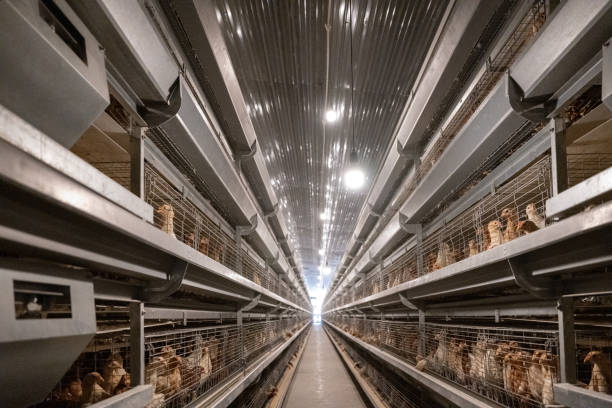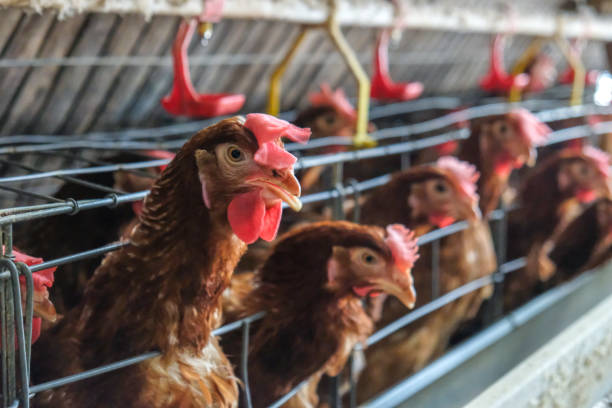
Find the Perfect Poultry Cage Equipment for Sale in Africa – Improve Egg Production
Find the Perfect Poultry Cage Equipment for Sale in Africa – Improve Egg Production
Africa’s poultry industry is on the rise. As demand for eggs and meat continues to grow, farmers are constantly seeking ways to boost production efficiency and profitability. One of the most critical elements in achieving these goals is selecting the right poultry cage equipment. In this comprehensive guide, we’ll explore the world of poultry cages available in Africa, focusing on egg-laying chicken cages and broiler chicken cages, offering insights to help you make the best choice for your farm.
Why Invest in Poultry Cage Equipment?
Before diving in, let’s understand why investing in quality poultry cage equipment is crucial for success in modern poultry farming.
Increased Production: Cages optimize space utilization, allowing you to house more birds within a given area. This translates directly to higher egg or meat production.
Improved Hygiene: Cages keep birds off the floor, reducing their exposure to manure and potential disease-causing pathogens. This leads to healthier birds and lower mortality rates.
Easier Management: Cages streamline feeding, watering, and egg collection. This reduces labor costs and makes it easier to manage your flock.
Better Egg Quality: In egg-laying systems, cages protect eggs from being soiled or broken, ensuring higher quality and marketability.
Precise Control: Cage systems allow for better control over environmental factors like temperature, ventilation, and lighting, optimizing bird comfort and performance.
Types of Poultry Cage Equipment:
When exploring poultry cage equipment for sale in Africa, you’ll primarily encounter two main types: egg-laying chicken cages and broiler chicken cages. Each is designed to meet the specific needs of its respective application.
Egg-Laying Chicken Cages:
These cages are specifically designed for housing laying hens. They typically feature several tiers of cages stacked vertically, maximizing space utilization.
Types of Laying Chicken Cages:
A-Frame Cages: A-frame cages are a widely used and economical option. Their simple design makes them easy to install and maintain. They usually feature a sloped wire floor that allows eggs to roll gently toward a collection trough.
H-Frame Cages: H-frame cages are a more advanced option, offering greater stability and durability. They often incorporate automatic feeding, watering, and egg collection systems, reducing labor requirements and improving efficiency.
Flat-Deck Cages: Flat-deck cages offer ease of access and are suitable for farms where manual egg collection is preferred. They typically have a single tier, simplifying management and observation.
Key Features to Consider:
Cage Size: Ensure the cage size is adequate for the number of hens you plan to house. Overcrowding can lead to stress and reduced egg production. Bird welfare must take priority.
Wire Mesh Quality: Opt for cages with high-quality, galvanized or coated wire mesh. This will prevent corrosion, ensure durability, and protect the birds’ feet.
Ventilation: Proper ventilation is crucial to remove ammonia and maintain air quality. Look for cages with adequate ventilation openings or consider incorporating ventilation fans.
Egg Collection System: Choose between manual, semi-automatic, or automatic egg collection systems based on your budget and labor availability.
Feeding and Watering Systems: Consider automatic feeding and watering systems to ensure consistent and efficient delivery of feed and water.
Manure Removal System: Efficient manure removal is essential for hygiene. Options include manual scraping, belt cleaning, and automatic flushing systems.
Advantages of Egg-Laying Chicken Cages:
Higher egg production per hen compared to floor systems.
Improved egg quality due to reduced breakage and contamination.
Easier monitoring and management of individual birds.
Reduced feed wastage.
Broiler Chicken Cages:
These cages are designed for raising broiler chickens, which are bred for meat production. Broiler cages are typically larger and more robust than egg-laying cages to accommodate the faster growth rate and heavier weight of broiler chickens.
Types of Broiler Chicken Cages:
Tiered Broiler Cages: Similar to egg-laying cages, tiered broiler cages maximize space utilization. However, they feature larger cage dimensions and stronger construction to support the weight of the broilers.
Single-Level Broiler Cages: Single-level broiler cages are easier to manage, especially for small-scale farms. They provide better access to the birds and simplify feeding and watering.

Key Features to Consider:
Cage Size: Ensure adequate space for the broilers to move freely and access feed and water.
Floor Type: Choose a floor type that is comfortable for the broilers and allows for easy manure removal. Options include wire mesh, plastic slats, and litter.
Ventilation: Proper ventilation is critical to control temperature and remove ammonia. Consider incorporating fans and ventilation openings.
Feeding and Watering Systems: Automatic feeding and watering systems are essential for efficient broiler production.
Manure Removal System: Efficient manure removal is crucial for hygiene and disease prevention.
Advantages of Broiler Chicken Cages:
Faster growth rates due to optimized environmental control.
Improved feed conversion efficiency.
Reduced mortality rates.
Easier monitoring and management of the flock.
Improved meat quality due to reduced bruising and contamination.
Factors to Consider When Choosing Poultry Cage Equipment:
Selecting the right poultry cage equipment requires careful consideration of several factors.
Farm Size and Capacity: Determine the number of birds you plan to house and choose cage equipment that is appropriately sized and configured for your farm. Consider future expansion plans when making your decision.
Budget: Poultry cage equipment represents a significant investment. Establish a budget and explore options that fit your financial constraints. Remember to consider the long-term cost savings associated with increased efficiency and reduced labor.
Climate Conditions: Africa’s climate varies significantly from region to region. Choose cage equipment that is suitable for your local climate. Consider factors like ventilation, insulation, and cooling systems to maintain optimal bird comfort.
Labor Availability: If labor is limited, consider investing in automated cage systems that can reduce labor requirements.
Local Regulations: Ensure that the cage equipment you choose complies with all applicable local regulations and standards for animal welfare and environmental protection.
Supplier Reputation: Choose a reputable supplier with a proven track record of providing high-quality poultry cage equipment and excellent customer service.
After-Sales Support: Inquire about the supplier’s after-sales support, including installation, maintenance, and spare parts availability.
Finding Poultry Cage Equipment for Sale in Africa:
Finding the right supplier for your poultry cage equipment is essential. Here are some tips:
Online Research: Search online for poultry cage equipment suppliers in Africa. Websites like Alibaba, Made-in-China and industry-specific platforms list various suppliers and their products.
Trade Shows: Attend agricultural trade shows and exhibitions in Africa to meet potential suppliers and see their products in person.
Referrals: Ask for referrals from other poultry farmers in your area.
Local Dealers: Check with local agricultural equipment dealers. They may carry poultry cage equipment or be able to connect you with reputable suppliers.
Direct Contact with Manufacturers: Consider contacting manufacturers directly to discuss your specific needs and obtain customized solutions.
Questions to Ask Potential Suppliers:
Before making a purchase, ask potential suppliers the following questions:
What types of poultry cage equipment do you offer?
What is the quality of the materials used in your cages?
What are the dimensions of your cages?
What is the capacity of your cages?
What are the feeding and watering systems included with your cages?

What is the manure removal system included with your cages?
What is the warranty on your cages?
Do you offer installation and maintenance services?
What is the lead time for delivery?
What is the price of your cages?
Do you have any references from other customers in Africa?
The Future of Poultry Farming in Africa:
The poultry industry in Africa is poised for continued growth. As demand for eggs and meat increases, farmers who invest in modern, efficient poultry cage equipment will be well-positioned to succeed. By carefully considering the factors outlined in this guide and choosing the right equipment for their specific needs, farmers can improve production efficiency, reduce costs, and enhance the overall profitability of their operations. The key is to look for suppliers who demonstrate expertise, offer robust after-sales support, and provide equipment designed to withstand the specific challenges of the African climate and farming conditions. Embracing innovation and carefully evaluating options will pave the way for a thriving and sustainable poultry industry in Africa.
